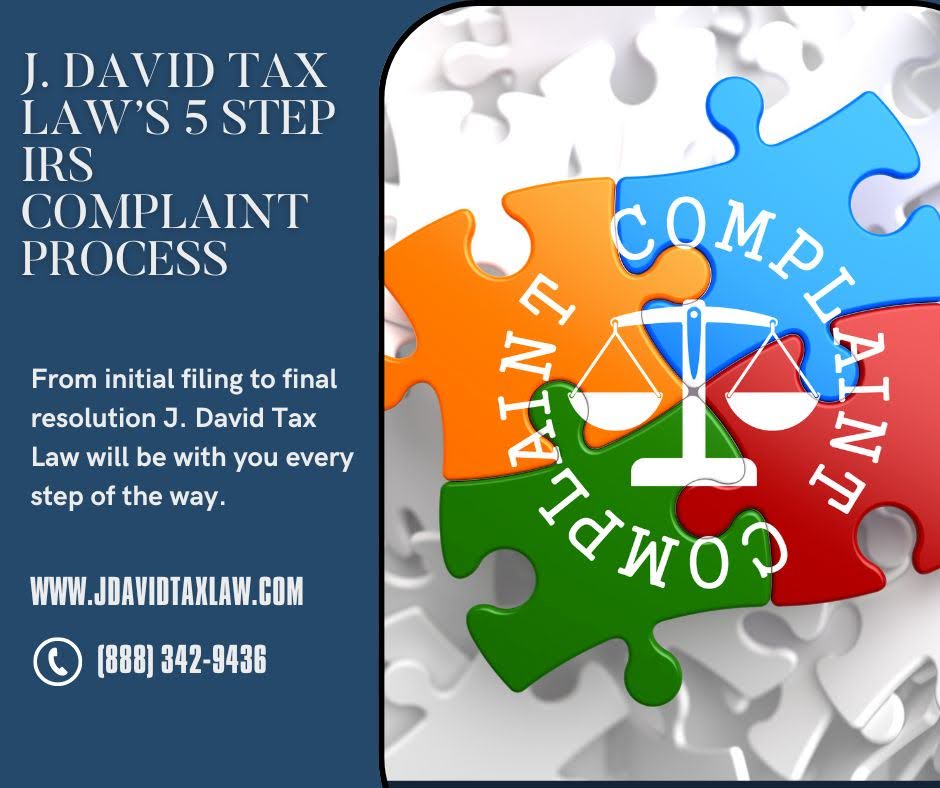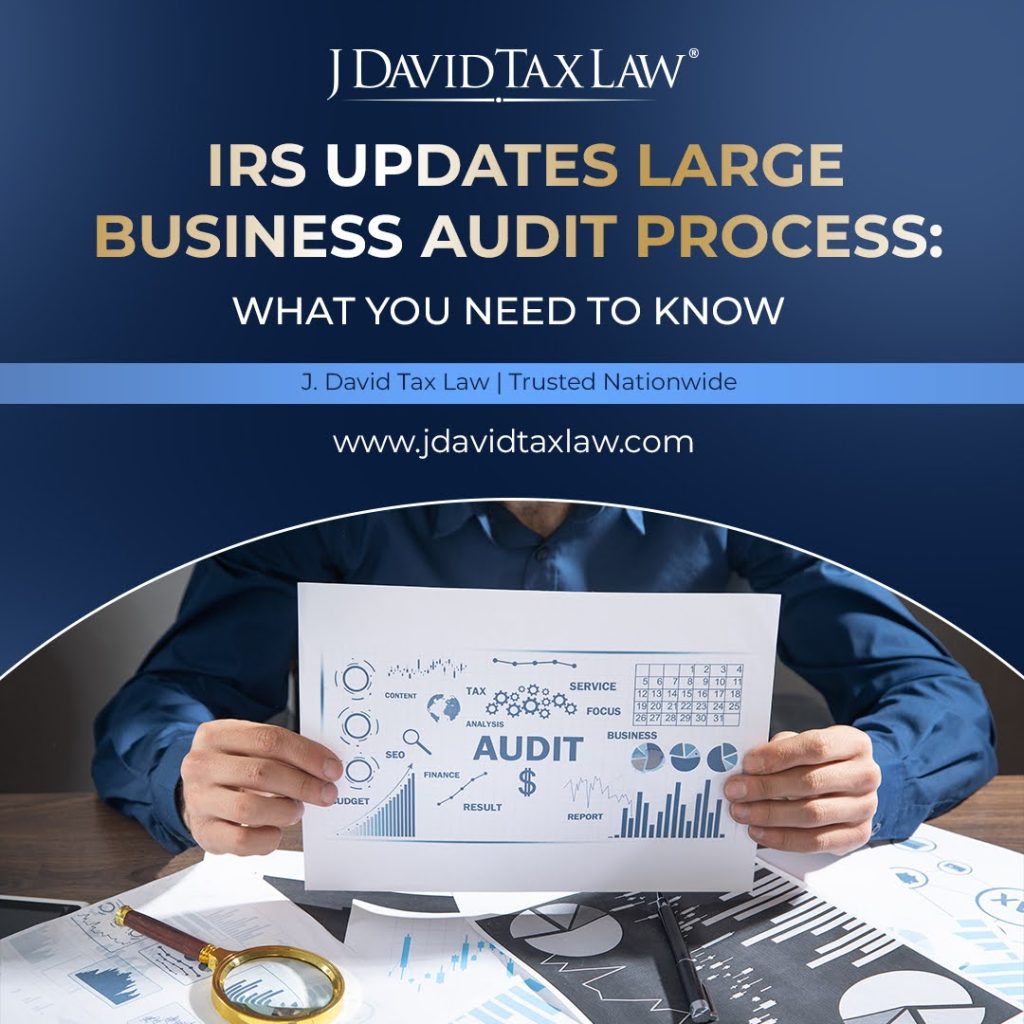Filing a complaint against the IRS is no small feat. It’s a daunting task that often comes with a mix of confusion and frustration, especially when dealing with employment taxes, unpaid taxes, or other tax law violations.
The team at J. David Tax Law, specializes in resolving these complex IRS disputes for their clients, emphasizing the importance of prompt and effective action. Their commitment ensures that every complaint handled receives the focused attention it deserves.
By addressing tax issues quickly and efficiently, they help prevent the escalation of penalties and ensure that their clients’ taxpayer rights are protected. Whether you’re challenging a tax return decision, facing issues with tax refunds, or dealing with a more complex tax noncompliance issue, they are there to guide you every step of the way.

Our 5-Step Process for Filing Complaints Against the IRS
Filing a complaint against the IRS involves a series of detailed steps, each critical to ensuring your grievances are heard and addressed. The team at J. David Tax Law guides clients through this process, so every complaint is handled with precision and care.
Step 1: Identifying the Issue
The process begins with pinpointing the specific tax issue you’re encountering. This critical first step ensures that any IRS complaint is focused and effective. They help to clarify specific concerns that may not be immediately apparent, such as underpayments of taxes due to calculation errors. By defining the issue, they make sure that the complaint is appropriately directed, whether to the IRS or through the Taxpayer Advocate Service.
Step 2: Gathering Relevant Documents
This step involves collecting all necessary documentation related to your tax issue. This includes tax return documents, evidence of tax payments, and any correspondence with the IRS. It’s vital to gather every piece of paperwork that could support your case, including documents that substantiate claims of tax law violations or details relevant to an investigative program.
Their team assists in organizing these documents and ensures that nothing crucial is omitted. Proper preparation of your evidence is essential for a clear presentation of your situation, which helps in communicating the specifics of your complaint to the appropriate authorities.
Step 3: Preparing the Complaint
Preparing the complaint involves writing a detailed complaint letter or filling out the specific IRS complaint form. This document must include all relevant information and details about the tax issue, such as descriptions of the problem, affected tax periods, and the impact on the taxpayer. It’s important to articulate the complaint clearly and each point is supported by the evidence gathered in the previous step.
Additionally, the complaint must include a declaration under penalty of perjury to affirm the truthfulness of the information provided. This declaration is a critical component, as it underscores the seriousness and accuracy of the complaint.
Step 4: Filing the Complaint
Filing the complaint can be done through several methods, including by phone, email, or traditional mail. The method used depends on the nature of the issue and personal preference. It is important to select the appropriate channel for submission to ensure the complaint is processed efficiently.
Our team guides clients through choosing the correct form and filing method. Our goal is for your complaint to reach the right department and is acknowledged by the IRS. This sets the stage for the next steps in resolving the tax issue.
Step 5: Finalizing the IRS Complaint: Acceptance or Litigation
In the final step of the IRS complaint process, J. David Tax Law’s focus is on achieving a resolution, whether through acceptance or further action. If the IRS accepts the complaint, the team works diligently to ensure clients receive the results they need, such as corrections to tax records, refunds, or other necessary adjustments. They keep clients informed throughout the resolution process, providing clarity and support as the IRS addresses their concerns.
However, if the IRS denies the complaint, the team is prepared to take the next steps in the litigation process. This involves exploring options such as filing an administrative appeal, pursuing litigation, or utilizing the Collection Appeals Program. They guide clients, helping them understand their rights and the best course of action. The goal is to ensure that each case is handled with the utmost care, striving for a fair and just outcome.
Throughout this process, J. David Tax Law remains committed to supporting clients every step of the way, ensuring their taxpayer rights are protected and working towards a satisfactory resolution of their IRS complaint.
Why Should J. David Tax Law Represent You Against the IRS?
Filing IRS complaints can be complex and stressful, but with J. David Tax Law on your side, you’re not alone. Our expertise and approach to tax disputes provide the support necessary to navigate this challenging process.
Experts in Tax Law and IRS Procedures
Our deep understanding of tax law and IRS procedures allows us to effectively manage complex IRS disputes. Our expertise ensures that your complaint is handled with precision and care.
Conduct Thorough Investigations and Case Assessments
We carry out detailed reviews on IRS criminal investigations and complex tax issues such as tax levies, wage garnishments, asset seizure, and IRS passport revocation, effectively. This focused approach ensures comprehensive understanding and robust negotiation with the IRS.
Ensure Effective Communication with the IRS
We maintain direct and effective communication with the IRS through various programs and centers. This approach ensures fair treatment for our clients and addresses all taxpayer concerns thoroughly. Our proactive communication strategy is key to navigating IRS processes and achieving favorable outcomes.
Conclusion
Filing IRS complaints is crucial for addressing and resolving tax disputes effectively. At J. David Tax Law, we pride ourselves on our ability to secure fair resolutions for our clients, leveraging our extensive expertise in tax law and IRS procedures.
If you’re facing tax issues or disputes, don’t navigate these challenges alone. Contact us today, and let our team provide the professional assistance you need to achieve a successful outcome.




















